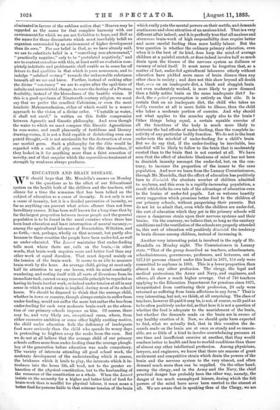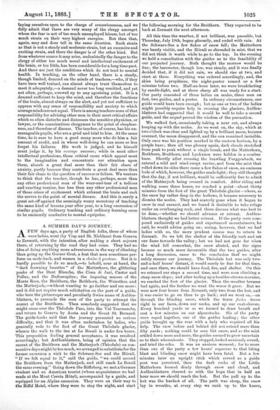EDUCATION AND BRAIN DISEASE.
WE should hope that Mr. Mundella's answer on Monday to the questions as to the effect of our Educational system on the health both of the children and the teachers, will silence for a time the nonsense that has been talked on the subject of education as a cause of insanity. It not only is not a cause of insanity, but it is a decided preventive of insanity, so far as anything can prevent what arises oftener than not from hereditary causes. It has been well known for a long time that by far the largest proportion between insane people and the general population is to be found in the rural counties where there has been least education and least interruption of mental vacancy,— among the agricultural labourers of Dorsetshire, Wiltshire, and so forth,—not, perhaps, wholly on that account, but partly also because in these counties the people have been under-fed, as well as under-educated. The Lancet maintains that under-feeding tells most where there are calls on the brain,—in other words, that brain-work requires more and better food than any other work of equal duration. That must depend mainly on the tension of the brain-work. It seems to us idle to measure brain-work by the hour. An average child, giving at most only half its attention to any one lesson, with its mind constantly wandering, and resting itself with all sorts of diversions from its immediate task, cannot on any reasonable principle be regarded as having its brain hard at work, or indeed under tension at all in any sense in which a real strain is implied, during most of its school hours. We should be disposed to think that the average child, whether in town or country, though always certain to suffer from under-feeding, would not suffer the more but rather the less from under-feeding for such very moderate brain-work as the educa- tion of our primary schools imposes on him. Of course, there may be, and very likely are, exceptional cases, where, from either excessive ambition or some other highly exciting motive, the child under education feels the deficiency of inadequate food more seriously than the child who spends its weary days in pretending to frighten away the rooks from the corn. But we do not at all believe that the average child of our primary schools suffers more from under-feeding than the average plough- boy of the generation before education was made compulsory. The variety of interests attending all good school work, the moderate development of the understanding which it causes, the briskness which it lends to play, the interests which it in- troduces into the home life, all tend, not to the greater ex- haustion of the physical constitution, but to the husbanding of the resources of the constitution as a whole. When the Lancet insists on the necessity for a higher and better kind of food for brain-work than is needful for physical labour, it must mean a better food for persons liable to that extreme tension of the brain which really puts the mental powers on their mettle, and demands continuous and close attention of an anxious kind. That is a very different affair indeed; and it is perfectly true that all anxious and strenuous brain-work of high responsibility does require better and more careful feeding than mere bodily labour. But the true question is whether the ordinary primary education, even when it is the best of its kind, does keep the mind of average children at a painful stretch, or does indeed involve half so much drain upon the tissnes of the nervous system as dullness or vacancy of mind itself. It must never be forgotten that, as a matter of fact, under-fed agricultural labourers utterly without education have yielded more cases of brain disease than any other class in society ; and does not this show beyond all doubt that, even on an inadequate diet, a blank and sluggish brain not even moderately worked, is more likely to grow diseased than a fairly active brain on the same inadequate diet? In- deed, the a priori presumption is entirely on that side. It is certain that on an inadequate diet, the child who takes no bodily exercise at all is more liable to illness, than the child who takes a moderate portion of exercise. And why should not what applies to the muscles apply also to the brain ? Other things being equal, a certain equable exercise of all the functions of the body is much more likely to minimise the bad effects of under-feeding, than the complete in- activity of any particular bodily function. We do not in the least under-rate the mischief of under-feeding for a child's brain But we do say that, if the under-feeding be inevitable, less mischief will be likely to follow to the brain that is moderately exerted than to the brain that is not exerted at all. We have seen that the effect of absolute blankness of mind has not been to diminish insanity amongst the under-fed, but, on the con- trary, to increase the proportion of the insane to the sane population. And now we learn from the Lunacy Commissioners, through Mr. Mundella, that the effect of education has positively been to diminish the absolute number of children admitted to asylums, and this even in a rapidly-increasing population, a result which tells its own tale of the advantage of education even to the brains of under-fed pupils. Let us welcome heartily every suggestion which promises better food to the children of our primary schools, without pauperising their parents. But do not let us admit that, even while the children are under-fed, the sort of education which they get in the primary schools will cause a dangerous strain upon their nervous systems and their brains. On the contrary, we believe that, so long as the sanitary conditions and the ventilation of the schools are properly attended to, this sort of education will positively diminish the tendency to brain disease among children, instead of increasing it.
Another very interesting point is involved in the reply of Mr. Mandela on Monday night. The Commissioners in Lunacy state, " That of the group described as teachers, schoolmasters, schoolmistresses, governesses, professors, and lecturers, out of 127,140 persons classed under this head in 1871, 154 only were committed to asylums in 1881. This is a lower proportion than almost in any other profession. The clergy, the legal and medical professions, the Army and Navy, and engineers, and others, all show a much higher average. Out of 746 teachers applying to the Education Department for pensions since ]875, incapacitated from continuing their profession, 24 only were returned as suffering from brain affections in any form." That is very interesting, but not, we think, at all surprising. The class of teachers, however ill-paid it may be, is not, of course, so ill-paid as to be often positively under-fed, so that here it is not a question of whether the food is adequate to the nourishment of the brain, but whether the demands made on the brain are in excess of any healthy exertion of it. Now, we should quite have expected to find, what we actually find, that in this vocation the de- mands made on the brain are at once so steady and so reason- able, are so little of a kind to involve overwhelming pressure at one time and insufficient exercise at another, that they would conduce better to health and less to morbid conditions than those of almost any other intellectual profession. Among physicians, lawyers, and engineers, we know that there are seasons of great excitement and competitive strain which drain the powers of the brain and the nervous system to the very utmost, and often demand much more than can be supplied. On the other band, among the clergy, and in the Army and the Navy, the chief practical danger has probably been the other way, namely, the danger of too much unemployed leisure, during which the full powers of the mind have never been exerted to the utmost at all. We are aware that in speaking thus of the Clergy, we are saying ourselves open to the charge of censoriousness, and we fully admit that there are very many of the clergy amongst whom the fear is not of too much unemployed leisure, but of too much strain on their very highest energies. But then that, again, may and does tell in the same direction. Such strain as that is not a steady and moderate strain, but an excessive and exciting strain, and there the danger is of the other kind. Bnt from whatever source it may arise, undoubtedly the danger to the clergy of either too much moral and intellectual excitement of the brain, or too little, has been considerable for a long time past. And these are just the conditions which do not tend to mental health. In teaching, on the other hand, there is a steady, though limited, demand on the minds of teachers,—who, if they have been well trained, can almost always trust themselves to meet it adequately,—a demand never too long remitted, and yet not often, perhaps, screwed up to any agonising point. It is a demand sufficient to keep the mind, and therefore the functions of the brain, almost always on the alert, and yet not sufficient to oppress with any sense of responsibility and anxiety to which average minds are not equal. There is among teachers none of that responsibility for advising other men in their most critical affairs which so often disturbs and distresses the sensitive physician, or lawyer, or the conscientious clergyman to the point of sleepless- ness, and therefore of disease. The teacher, of course, has his un- manageable pupils, who are a grief and trial to him. At the same time, he is sure to have a good many more who do him a fair amount of credit, and in whose well-doing he can more or less forget his failures. His work is judged, and he himself must judge it, by his average success ; while in most other intellectual professions, those critical cases which appeal most to the imagination and concentrate our attention upon them, absorb a great deal more than their fair share of anxiety, partly because they contribute a great deal more than their fair share to the question of success or failure. We venture to think that the teacher, though he has, perhaps, more than -any other professional man of the wear-and-tear of a tedious and exacting routine, has less than any other professional man of those crises of excitement which exhaust the brain and rack the nerves to the point of mental disease. And this is surely a great set-off against the seemingly weary monotony of teaching the same kind of lessons year after year, to a long succession of similar pupils. Ordinary teaching and ordinary learning seem to be eminently conducive to mental equipoise.



































 Previous page
Previous page